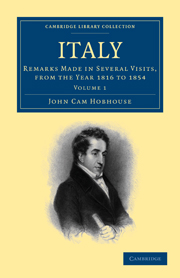Summary
The country between Verona and Montebello appeared to Burnett, nearly two centuries ago, to be better cultivated than any other part of Italy. The merit of the culture is not easily determined by a passing traveller, but nothing can exceed the beauty of it, nor the apparent richness. The vines hang in festoons from rows of mulberry trees, in fields of clover, and millet, and maize, and other grains. The neighbouring hills are clothed with vineyards and gardens to their summits, and are studded with white villages and villas, with, here and there, an old castle, or a walled town, upon a distant height. The country, on the day we passed (1816), seemed to have poured forth all its population into the roads. All classes, gaily or neatly dressed, were hurrying to the fair at Verona; groups of children were playing in the fields by the road-side, and one little girl was swinging on a festoon of vine tendrils between the mulberry trees. There was nothing in the scene to remind us that this country had been a battlefield over and over again, and, only a little more than two years ago, had been the theatre of war. Montebello, indeed, with its castle, did recall the victory and the title of one of Napoleon's most favoured marshals.
- Type
- Chapter
- Information
- ItalyRemarks Made in Several Visits, from the Year 1816 to 1854, pp. 83 - 100Publisher: Cambridge University PressPrint publication year: 2009First published in: 1859

